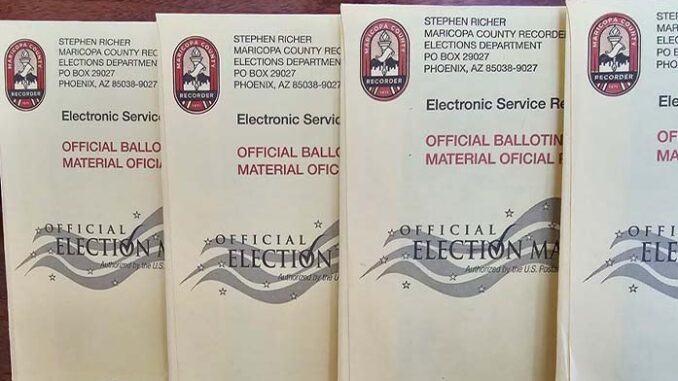
On Monday, Senate and House Republicans announced that they have crafted what they say is a “comprehensive solution to correct unintended election deadline conflicts arising from past legislation.”
In 2022, a bill sponsored by then-Sen. Michelle Ugenti-Rita, SB1008, which reduced the threshold percentage that would trigger automatic recounts in statewide elections.
The bill received overwhelming bipartisan support in an effort to improve voter confidence on tight races. Under the law, automatic recounts in statewide elections are triggered when the margin of victory is within half of one percentage point of total votes cast, bringing Arizona in line with several other states. The previous law required an what many believed was an arbitrary and much narrower margin of just 200 votes before a recount could occur.
The change is expected to increase the number of recounts in the state. Subsequently, counties informed Senate and House Leadership Teams in late September 2023 that there would be potential delays in results, preventing counties from meeting several important federal deadlines:
• Mandatory mailing deadline (September 21, 2024) to send out November 2024 General Election Ballots to military and overseas citizens (UOCAVA)
• Safe Harbor (December 10, 2024) & Presidential Electors Meeting (December 16, 2024)
SB1733/HB2785 establishes a permanent fix while ensuring every legal ballot cast is counted accurately to make certain the correct candidate, or ballot measure, is declared winner. The bill provides counties with an extra 19 days in the primary election calendar and an extra 17 days in the general election calendar to give officials more time to meet federal deadlines. Additionally, the bill provides a number of time-saving reforms that encourage efficiency, transparency, and most importantly– integrity within our election systems.
“This commonsense solution promises to strengthen voter confidence, is backed by all Arizona county recorders, and allows our men and women who are serving in our armed forces overseas the opportunity cast a ballot in our elections,” said Senate Elections Committee Chair Wendy Rogers. “I’m hopeful this legislation will receive bipartisan support and the Governor will sign it. Anything less will throw our elections into turmoil and disenfranchise lawful Arizona voters.”
“There were many simpler ways to solve this problem, some of which do not require legislative solutions,” said Representative Alexander Kolodin, Sponsor of HB2785. “Nevertheless, we negotiated in good faith and agreed to accept this more complicated solution in exchange for signature verification and several other commonsense reforms. It should be noted that the problem this bill seeks to avoid is highly unlikely to occur in 2024.”
Attorney General Kris Mayes has come out in opposition to the bill to the surprise of no one. Mayes narrowly won the attorney general’s race against Abe Hamadeh by a mere 280 votes out of more than 2.5 million ballots cast.
Gov. Katie Hobbs, Mayes, and Secretary of State Adrian Fontes successfully persuaded a Mohave County judge to shut the courthouse door on Hamadeh and end all inquiries into which AG candidate actually received the most votes exactly one year ago today.
Now, Mayes says she is concerned that the Republican’s proposal “does not offset the harm that would be caused by shortening the cure period from five business days to five calendar days and includes policies entirely unrelated to the timeline issue. I am particularly concerned about the impact the shortened cure period would have on our state’s rural, tribal, and low-income voters.”
However, Republicans note that a provision has been added directing county recorders’ offices to be “open and to allow for signatures to be cured during the weekend before and after primary, general or special elections that include a federal office,” which actually should increase a voter’s access to the curing process.
“Of course Kris Mayes would be concerned, she is, after all, the beneficiary of our broken system,” said Koldoin.
RELATED ARTICLE:
Mayes, Fontes Oppose New Trial As Hamadeh Focuses On Evidence Hobbs Kept From Judge
